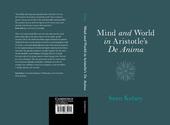
|
Mind and World in Aristotle's De Anima
Hardback
Main Details
| Title |
Mind and World in Aristotle's De Anima
|
| Authors and Contributors |
By (author) Sean Kelsey
|
| Physical Properties |
| Format:Hardback | | Pages:240 | | Dimensions(mm): Height 235,Width 158 |
|
| Category/Genre | Western philosophy - Ancient to c 500
Philosophy - metaphysics and ontology
Philosophy of the mind |
|---|
| ISBN/Barcode |
9781108832915
|
| Classifications | Dewey:128 |
|---|
| Audience | |
|---|
| Illustrations |
Worked examples or Exercises; Worked examples or Exercises
|
|
Publishing Details |
| Publisher |
Cambridge University Press
|
| Imprint |
Cambridge University Press
|
| Publication Date |
16 December 2021 |
| Publication Country |
United Kingdom
|
Description
Why is the human mind able to perceive and understand the truth about reality; that is, why does it seem to be the mind's specific function to know the world? Sean Kelsey argues that both the question itself and the way Aristotle answers it are key to understanding his work De Anima, a systematic philosophical account of the soul and its powers. In this original reading of a familiar but highly compressed text, Kelsey shows how this question underpins Aristotle's inquiry into the nature of soul, sensibility, and intelligence. He argues that, for Aristotle, the reason why it is in human nature to know beings is that 'the soul in a way is all beings'. This new perspective on the De Anima throws fresh and interesting light on familiar Aristotelian doctrines: for example, that sensibility is a kind of ratio (logos), or that the intellect is simple, separate, and unmixed.
Author Biography
Sean Kelsey is Associate Professor of Philosophy at the University of Notre Dame. His work has appeared in Ancient Philosophy, Apeiron, Oxford Studies in Ancient Philosophy, Phronesis and several edited volumes.
Reviews'Sean Kelsey asks important questions about Aristotle's views on the fit between the mind or soul and the world. How are humans knowers and perceivers? How is the world knowable and perceivable? The proposed answers shed new light on the De Anima and on the methods Aristotle uses to pursue these questions.' James Warren, University of Cambridge
|